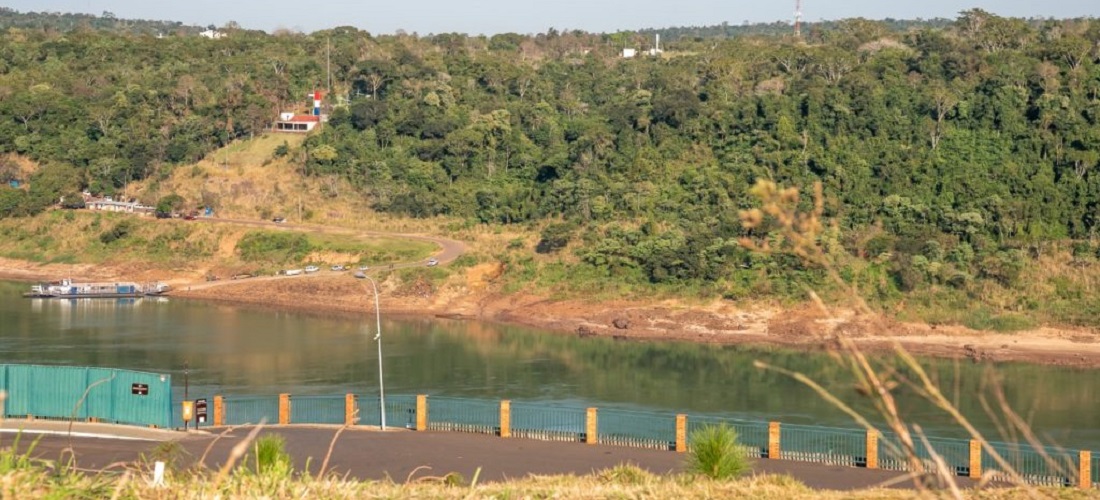
Bridge of Integration could generate unprecedented agreement between Brazil and Paraguay
Aug, 28, 2019 Posted by Sylvia SchandertWeek 201936
An unprecedented trade agreement between Brazil and Paraguay could be created to avoid tax surcharges on the material that will be used in the construction of the Bridge of Integration. Discussions on the topic were raised at a meeting of Itaipu’s Coordination Board, which discussed, among other matters, solutions to ensure that inputs, such as cement and steel, that have already paid taxes in Brazil are not taxed again upon entering Paraguay.
Funded by Itaipu Binacional’s Brazilian bank, the second bridge over the Paraná River will link Foz do Iguaçu (BR) to Presidente Franco (PY). The trade agreement, whose proposal will be brought to the diplomacy of the two countries by representatives of Itaipu, could also be applied on the other bridge between Brazil and Paraguay – which will link Porto Murtinho (BR) to Carmelo Peralta (PY), which is part of the Bioceanic Road Corridor (Brazil, Paraguay, Argentina, and Chile), which will be funded by Itaipu’s Paraguayan bank.
A binational agreement like this already has precedent: the 1990s, when the so-called International Bridge of Integration, over the Uruguay River, was built, linking the gaucho municipality of São Borja (Brazil) to Santo Tomé (Argentina). At the time, through the exchange of notes signed by the Brazilian and Argentine governments, an agreement was created that exempted the materials from all import duties or any taxes.
This agreement is important because the inputs that will be incorporated into the bridge on the Paraguayan bank are taxed with the Value Added Tax (VAT), related to the importation of that product in Paraguay. With regard to the machinery there is no problem, as it is subjected to the temporary export regime, which suspends the payment of taxes, provided that these machines, such as trucks and tractors, return to the country of origin within a specified period.
“The two bridges are strategic for both countries, so it is in the interest of Brazil and Paraguay that these issues be resolved,” commented Brazilian Director-General of Itaipu, General Joaquim Silva e Luna. “With the Bridge of Integration completed, a new era will begin for countries that can expand their trade and open import and export markets to other countries in the region,” he concluded.
Logistics facilitation
The suggestion of a binational trade agreement to rid the surcharge of construction material is another effort to facilitate the viability of the construction, which adds to the normative instruction that is under development by the Brazilian IRS. The intention of the document is to quickly clear the transit of machinery and material involved in the construction by means of a simplified guide. The instruction will be promulgated by the Brasilia Customs Coordination within 20 days.
“Our goal is that the construction of the bridge does not harm the service of the dry port in Foz do Iguaçu and that the service in the port does not hinder the construction”, explains the Customs Officer of the Internal Revenue Service in Foz do Iguaçu, Paulo Bini. Every day more than 700 trucks pass through the dry port, which is considered the largest in Latin America.
In addition to speeding up the procedures in the dry port, the normative instruction will allow the departure of the country by an auxiliary port, within the project, by which the consortium will move equipment, machinery, and personnel. On the Paraguayan bank, it is planned to use the port of Presidente Franco, which already has a customs structure.
Project Progress
For the next three months, on the Paraguayan bank, the Construbase-Cidade-Paulitec consortium will concentrate its work on earthmoving, lifting the construction site, and placing the cofferdams to allow the foundation to be created by the fourth month – the main block which will hold the 120-meter masts responsible for the bridge support.
The delivery time of the Bridge of Integration is 36 months. The investment of R$463m is made entirely by Itaipu’s Brazilian margin. Of this amount, R$323m will be used in the construction of the bridge and R$140m in the Perimetral Leste works, between the bridge and BR-277.
With 760 meters long and 470 meters free span, the largest of cable-stayed bridges in Brazil, the construction will have two 120m high towers. The track will be simple, with a width of 3.7m, 3m shoulder, and a 1.7m sidewalk.
East Perimeter
Perimetral Leste will connect the Bridge of Integration with BR 277 in Foz do Iguaçu, diverting heavy truck traffic from the city center. This project is carried out by Construtora JL, from Cascavel. Like the bridge, the lead time will also be 36 months, starting at the time of the signing of the work order. The expectation of the construction company is that the signing will happen until next week.
This contract also provides for the construction of customs on the Brazilian bank, with the IRS and Federal Police posts.
Source: Imprensa Itaipu Binacional
-
Grains
Jul, 17, 2019
0
Argentina and Brazil soybean exports to rise in 2019/20 season
-
Grains
Aug, 16, 2019
0
China increases soybean imports from Brazil
-
Grains
Aug, 07, 2019
0
Brazil soybean exports to china drop 20% in July 2019
-
Grains
May, 24, 2019
0
African swine flu in China will impact Argentina’s soybean exports

